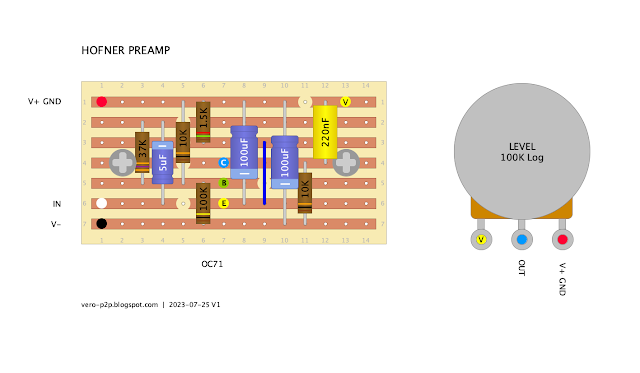There's a good write up here, but in summary: Back in the day before guitar amps were affordable, and TV was a thing, pretty much everyone had a big valve radio in the house. Many had an input for turntables, but most people didn't have a turntable as they were expensive. So Hofner made a preamp to allow early electric guitars to be plugged into a valve radio, via this additional and often unused input.
The preamp boosts signal and helped fix the massive impedance difference, turning the family radio into a primitive guitar amp.
Worth noting that old record players had a much higher output than the current ones, hence the need for a boost. The output was so high, that when you look at old schematics for valve PA systems, the P.U. input skips the first 12AX7 gain stage, and goes straight to a mixer, so guitars really needed an extra boost to make it work.
HOFNER PREAMP SCHEMATIC
It kicks out a good 20dB of boost and has a relatively flat response
I'd be very surprised if the boost is as clean as it looks on LTspice - I'll have to breadboard this and check it out on the scope. I'm sure there would be some dirt.
MODS
I guess the first and most obvious is adding a volume pot. A 220n output cap is pretty healthy, so a standard A100K volume pot will work just fine. Note the R2R electric method, which is similar to a rangemaster. This is probably a better way to do it.
Reducing R1 increases the input level, as it normally forms a voltage divider with R2. Things will get a little fuzzy and overdriven.
C1 can be reduced to treble booster territory.
C4 can be reduced for a bit of low-end roll-off.
TAGBOARD & VERO LAYOUTS
The original was constructed in a very similar fashion to the Rangemaster - a simple point-to-point circuit in a box.








1 comment:
wow, interesting part of history, enjoy your posts, thanks
Post a Comment